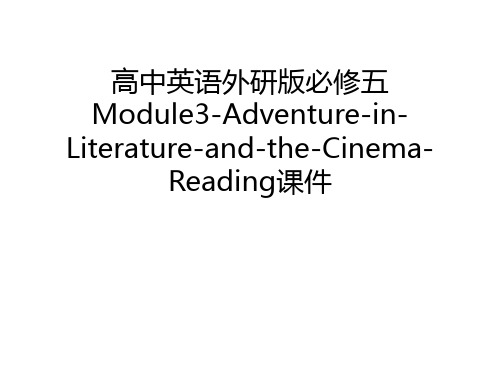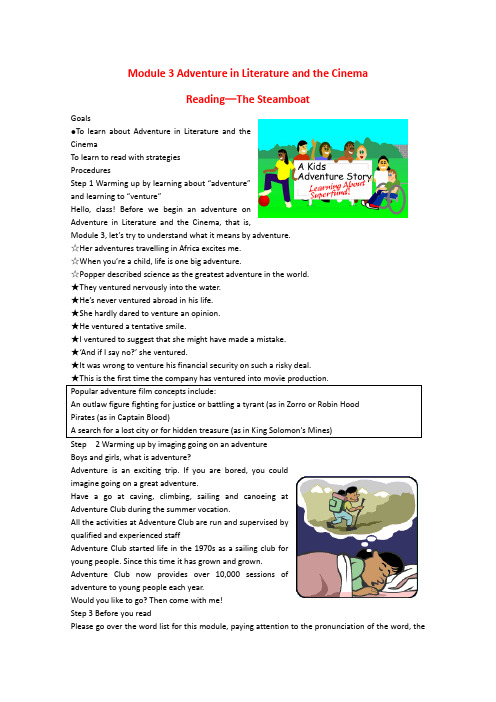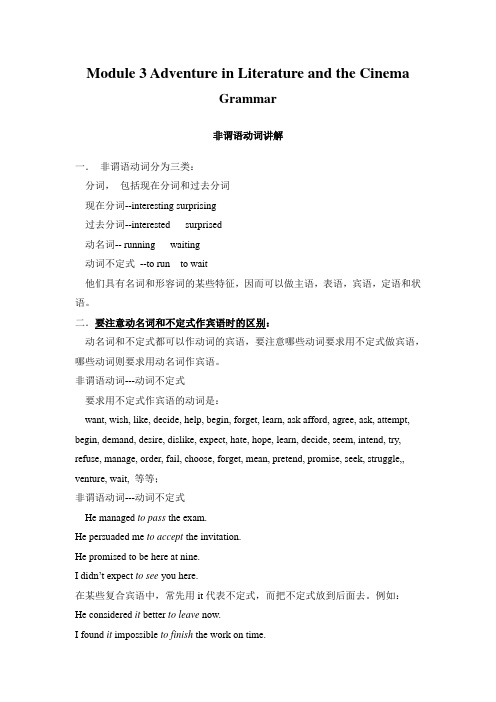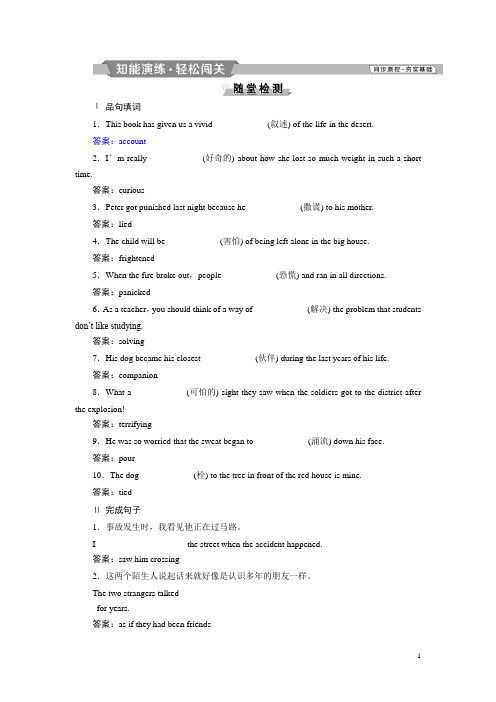外研版必修五Module-3-Adventure-in-Literature-and-the-Cin
- 格式:ppt
- 大小:2.45 MB
- 文档页数:25

Module 3 Adventure in Literature and the CinemaI. 教学内容分析本模块的主题是文学和电影作品中冒险故事,通过马克·吐温的冒险小说《哈克贝利·芬历险记》片断的学习使学生了解如何描写冒险小说,另外通过本模块学习还要了解不同的文学作品和电影作品类型,并能运用所学过的知识仿写一篇电影或小说的简介.最后,通过本模块的学习还要帮助学生了解文学,培养对文学的兴趣,扩大文学视野本模块从不同的文学作品类型开始,导入本模块的话题——文学和电影作品中冒险故事。
Introduction 部分通过于三本书的封面介绍了三种不同的文学作品类型并列出了有关文学作品的一些单词,让学生说出自己喜欢的类型并且利用新单词给出理由,能激发学生的好奇心。
并同通过阅读《哈克贝利·芬历险记》书评的开头效果导入整个模块的话题—-文学和电影作品中冒险故事。
Reading and Vocabulary是通过马克·吐温的冒险小说《哈克贝利·芬历险记》片断的学习使学生了解如何描写冒险小说。
并通过设计的练习让学生熟悉课文内容和学会使用一些相关词汇。
Grammar部分主要复习的语法项目是动词的-ed和—ing形式,动词不定式和一些连系动词的用法.Learning to learn是教学生如何巧计感观动词的用法,对于提高学习策略水平有很大的帮助。
Vocabulary and Listening部分第一部分设计一个学习有关电影类型的词汇的活动,第二和三部分则通过听一段关于讨论决定看电影上映的哪部电影的对话,让学生听出电影的内容猜测电影名称。
Speaking部分让以电影为话题谈论所喜欢的电影并解释理由,能根据同学提供的内容猜测电影名称。
Function要求学生掌握怎样将表示“陈述"和“建议"的直接引语变为间接引语。
Writing首先让学生读两篇小说或电影的简介,接下来要求学生运用所学过的知识仿写一篇电影或小说的简介。



Module 3 Adventure in Literature and the CinemaReading—The SteamboatGoals●To learn about Adventure in Literature and theCinemaTo learn to read with strategiesProceduresStep 1 Warming up by learning about “adventure”and learning to “venture”Hello, class! Before we begin an adventure onAdventure in Literature and the Cinema, that is,Module 3, let’s try to understand what it means by adventure.☆Her adventures travelling in Africa excites me.☆When you’re a child, life is one big adventure.☆Popper described science as the greatest adventure in the world.★They ventured nervously into the water.★He’s never ventured abroad in his life.★She hardly dared to venture an opinion.★He ventured a tentative smile.★I ventured to suggest that she might have made a mistake.★‘And if I say no?’ she ventured.★It was wrong to venture his financial security on such a risky deal.Boys and girls, what is adventure?Adventure is an exciting trip. If you are bored, you couldimagine going on a great adventure.Have a go at caving, climbing, sailing and canoeing atAdventure Club during the summer vocation.All the activities at Adventure Club are run and supervised byqualified and experienced staffAdventure Club started life in the 1970s as a sailing club foryoung people. Since this time it has grown and grown.Adventure Club now provides over 10,000 sessions ofadventure to young people each year.Would you like to go? Then come with me!Step 3 Before you readPlease go over the word list for this module, paying attention to the pronunciation of the word, therelationship between its pronunciation and its spelling.Step 4 While you readCut/ the sentences into thought groups, blacken the predicates, underline the useful expressions and darken the connectives.Step 5 After you readA steamboat or steamship, sometimes called a steamer, is a boat or vessel that is propelled by steam power driving a propeller or paddlewheel. The term steamboat is usually used to refer to smaller steam-powered boats working on lakes and rivers, particularly riverboats in the USA; steamship generally refers to steam powered ships capable of carrying a (ship's) boat. Nuclear powered ships and submarines use steam to drive turbines, but are not referred to as steamships or steamboats.Screw-driven steamships generally carry the shipprefix "SS" before their names, or "TS" wherepowered by a steam turbine. Paddle steamershave the prefix "PS". The term steamer is occasionally used, out of nostalgia, for diesel motor driven。

Module 3 Adventure in Literature and the CinemaGrammar非谓语动词讲解一.非谓语动词分为三类:分词,包括现在分词和过去分词现在分词--interesting surprising过去分词--interested surprised动名词-- running waiting动词不定式--to run to wait他们具有名词和形容词的某些特征,因而可以做主语,表语,宾语,定语和状语。
二.要注意动名词和不定式作宾语时的区别:动名词和不定式都可以作动词的宾语,要注意哪些动词要求用不定式做宾语,哪些动词则要求用动名词作宾语。
非谓语动词---动词不定式要求用不定式作宾语的动词是:want, wish, like, decide, help, begin, forget, learn, ask afford, agree, ask, attempt, begin, demand, desire, dislike, expect, hate, hope, learn, decide, seem, intend, try, refuse, manage, order, fail, choose, forget, mean, pretend, promise, seek, struggle,, venture, wait, 等等;非谓语动词---动词不定式He managed to pass the exam.He persuaded me to accept the invitation.He promised to be here at nine.I didn’t expect to see you here.在某些复合宾语中,常先用it代表不定式,而把不定式放到后面去。
例如:He considered it better to leave now.I found it impossible to finish the work on time.非谓语动词---动词不定式由only, last, next 序数词或形容词最高级修饰的名词常用不定式做定语; 不定式还可用作名词或代词的的宾语She is always the first student to arrive at school.He is always the last one to leave the office.I don’t think he is the best man to do the job.I have no desire to travel.You’ll find something to interest you here.There is no need to bother him with such trifles.非谓语动词---动词不定式不带to 的动词不定式在有些使役动词及感官动词后可用省略to的动词不定式,如let, make, have, hear, see, feel, smell, hear, watch等。

Ⅰ品句填词1.This book has given us a vivid ____________(叙述) of the life in the desert.答案:account2.I’m really ____________(好奇的) about how she lost so much weight in such a short time.答案:curious3.Peter got punished last night because he ____________(撒谎) to his mother.答案:lied4.The child will be ____________(害怕) of being left alone in the big house.答案:frightened5.When the fire broke out,people ____________(恐慌) and ran in all directions.答案:panicked6.As a teacher,you should think of a way of ____________(解决) the problem that students don’t like studying.答案:solving7.His dog became his closest ____________(伙伴) during the last years of his life.答案:companion8.What a ____________(可怕的) sight they saw when the soldiers got to the district after the explosion!答案:terrifying9.He was so worried that the sweat began to ____________(涌流) down his face.答案:pour10.The dog ____________(栓) to the tree in front of the red house is mine.答案:tiedⅡ完成句子1.事故发生时,我看见他正在过马路。
Module 3 Adventure in Literature and the CinemaGrammar直接引语转换成间接引语的规则引述或转述别人的话称为“引语”。
直接引用别人的原话,叫作直接引语,用自己的语言转述别人的话,叫作间接引语。
直接引语用引号标出,而间接引语不需要引号。
直接引语为陈述句。
一般疑问句,特殊疑问句,和祈使句,转换成间接引语时,句子的结构,人称,时态,时间状语和地点状语都有变化。
1.人称的转变直接引语转化成间接引语时,人称要根据情况作必要的变化。
She said , “I am very sorry.”----- She said that she was very sorry.“ You should be more careful next time,” my father told me.---- My father told me that I should be more careful the next time.He said to his son, “I’ll check your homework tonight.”----- He said to his son that he would check his homework that night.2. 时态的转换直接引语改为间接引语时,主句的谓语动词如果是过去时,从句(即间接引语部分)的谓语动词在时态方面要作出相应的变化,变成过去时范畴的各种时态(实际也是宾语从句的时态要求)。
3.时间状语,地点状语及某些对比性的指示代词和动词的变化。
4.直接引语变成间接引语时,从句时态无须改变的情况。
1)直接引语表述的是客观事实。
科学真理和格言时,例如:The teacher said “ The earth moves round the sun.”---- The teacher said that the earth moves round the sun.He said, “ Practice makes perfect.”----- He said that practice makes perfect.2) 主句的时态是一般现在时、现在进行时或一般将来时时。